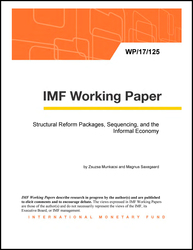
Structural Reform Packages, Sequencing, and the Informal Economy
This paper explores the macroeconomic impacts of labor and product market deregulation using a small open-economy model with formal and informal markets. We examine both the long-run effects and the transition towards the post-reform equilibrium, while our main focus are reform packages and sequencing. The unofficial sector is a major determinant of the sign, and, in particular, the magnitude of responses. South Africa, an emerging country, is considered when Bayesian estimating the model. Regarding the long run, both labor and product market reforms considerably increase output, although labor market reforms are more successful in decreasing unemployment. Nevertheless, there are short-term costs, for example, a decrease in household consumption, net exports or output, or a decrease in competition. Combining reforms, especially with product market deregulation, are good at reducing short-term costs. Finally, concerning the speed of adjustment, it is usually better to start with a labor market reform.
Publication date: May 2017
ISBN: 9781484302101
$18.00
Add to Cart by clicking price of the language and format you'd like to purchase
Available Languages and Formats
| English |
Prices in red indicate formats that are not yet available but are forthcoming.
Topics covered in this book
This title contains information about the following subjects.
Click on a subject if you would like to see other titles with the same subjects.
structural reforms , labor market deregulation , product market deregulation , unemployment , hiring costs , endogenous firm entry , shadow economy , informal employment , small-open economy , reform packages , sequencing
Summary
Copyright © 2010 - 2024
Powered by:
AIDC



